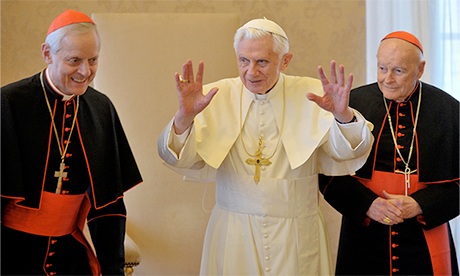While Archbishop Carlo Maria Viganò makes a number of accusations against former and current Vatican officials in his 11-page letter, there is only one he aims at Pope Francis.
Vigano alleges Pope Francis knew former Cardinal Theodore McCarrick had “corrupted generations of seminarians and priests” but nonetheless decided to lift sanctions.
Sanctions that included “a life of prayer and penance” which had been imposed on the retired D.C. archbishop by Pope Benedict XVI in either 2009 or 2010.
Archbishop Viganò, the papal representative to the United States from 2011 until he was recalled to Rome by Pope Francis in 2016, did not provide documents proving that sanctions were imposed by Benedict.
Nor did he provide evidence that Francis knew about the sanctions or that he lifted them.
During the years that then-Cardinal McCarrick was allegedly sanctioned by Rome, he kept up a public profile that included preaching at high-profile Masses, giving talks and accepting awards.
He testified in front of a Senate subcommittee and appeared in the media.
The cardinal also kept up a famously robust travel schedule, in part because he served on the board of Catholic Relief Services and chaired the board of the charitable arm of the international development nonprofit.
A spokeswoman for C.R.S. told America that then-Cardinal McCarrick traveled on “a couple of dozen trips during that time, including in Asia, Africa, the Middle East and Latin America” between 2009 and the end of Pope Benedict’s papacy in 2013, adding that C.R.S. was “unaware” of any sanctions.
Archbishop Viganò alleges that after several specific attempts to convince the Vatican that then-Cardinal McCarrick should be sanctioned because of allegations of sexual misconduct with priests and seminarians, prohibitions were handed down in 2009 or 2010.
Those sanctions, he said, required the cardinal to move out of a seminary where he was living and forbade him to celebrate Mass in public, participating in public meetings, giving lectures or traveling.
He was to dedicate “himself to a life of prayer in penance.”
Pope Francis removed then-Cardinal McCarrick from ministry in June following substantiated allegations that he had sexually abused a minor decades ago.
Sharon Euart, R.S.M., a canon lawyer and the executive director of the Resource Center for Religious Institutes, said that while she could not comment on the specifics regarding the onetime archbishop of Washington, D.C., a priest or bishop who is punished with sanctions removing him from ministry would be notified in writing.
Sister Euart said that whoever has jurisdiction over the offender would normally be notified of the penalty so that the offender could be monitored.
In the case of then-Cardinal McCarrick, it is not clear who may have been asked to monitor him.
Cardinal Donald Wuerl, who succeeded Archbishop McCarrick in Washington, has said he was not made aware of any sanctions, a statement challenged by Archbishop Viganò.
“There is certainly expectation that they would abide by the regulations of their particular situation,” Sister Euart said, adding that she would find it “unusual” for such penalties to remain secret. Continue reading
- Image: America Magazine
Additional reading
News category: Analysis and Comment.




